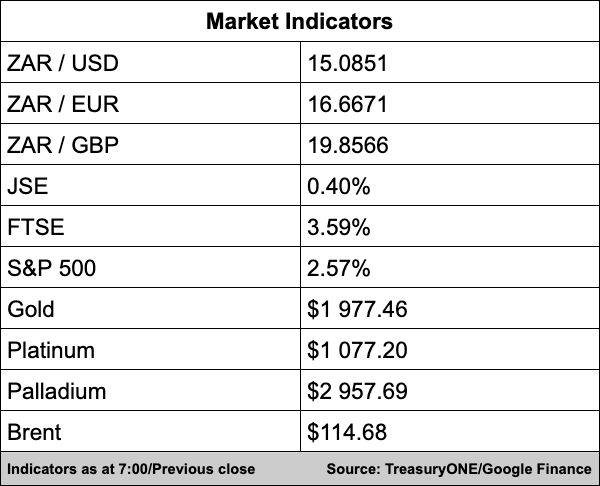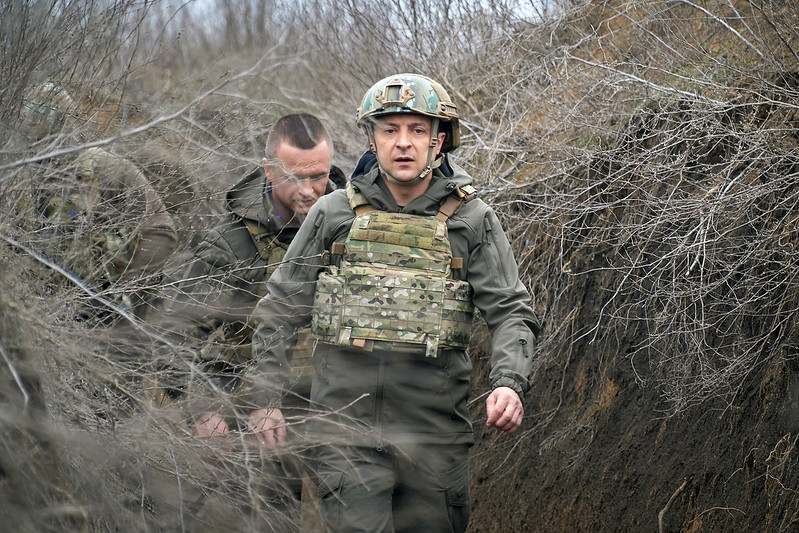This morning we’re turning our attention to possible diplomatic solutions to the war in Ukraine with top aides in Ukrainian president Volodymyr Zelensky’s administration saying he is open to discussing neutrality with Russia as long as Ukraine is given security measures, reports Bloomberg.
Ihor Zhovkva, Zelensky’s deputy chief of staff, told Bloomberg the first conditions Ukraine would ask for in any diplomatic negotiation is an immediate ceasefire and withdrawal of Russian troops while Zhovkva said Zelensky would not cede a “single inch” of territory to Putin.
Zelensky is also open to having a direct meeting with Russian President Vladimir Putin to discuss a diplomatic end to the war but his advances have not received any response from the Kremlin in Moscow. Ukraine reiterated its desire to join NATO, a red line for Putin, while also still wanting to fast-track its membership to the European Union.
Zhovkva said security guarantees from Russia alone would not be enough and that Ukraine would need guarantees from neighbours and allies like the US, UK, and Germany.
Zelensky is reportedly also open to discussing the independence of Crimea, which Putin annexed from Ukraine in 2014, and the separatist regions in the eastern part of the country, Donbas.
The Ukrainian president reiterated his call to have the airspace closed on Wednesday and called on allies to impose no-fly zones saying Ukraine could not win the war alone.
Zelensky called for the no-fly zones to be imposed as Ukrainian cities faced heavy attacks that included the bombing of a maternity hospital in one of the worst-hit cities – Mariupol.
Here’s hoping that the war in Ukraine may soon find a peaceful resolution and that Russia’s aggression comes to an end, but having watched Putin operate, you’d be forgiven for thinking otherwise.
On home soil, race plays the biggest role in driving the ever-widening gap between the haves and the have nots, according to the World Bank.
Race “remains a key driver of South Africa’s high inequality through its impact on both education and labor-market outcomes,” a new report released by the World Bank said.
The report – titled Inequality in Southern Africa – focused on South Africa and its neighbouring countries and used the Gini coefficient to rank the countries. The report only took race into account for South Africa as there wasn’t much data available from the other nations yet race still plays a major role in inequality in Namibia where 70% of farming land is still owned by those of European descent.
“In Namibia and South Africa, the story is one of incomplete transition after apartheid,” the authors said. “Political progress in these countries has not been matched by progress in equity and economic fairness.”
To reduce inequality the bank recommended implementing four pillars, you can read them here.
In the markets, there has been a jump in risk appetite following the news that Ukraine is willing to have diplomatic talks with Russia, the oil price has dropped 14% and the dollar retreated sharply.
“The rand, which was already trading on the front foot, firmed to R14.98 levels before closing at R15.00, nearly 1.8% stronger on the day. The local currency is currently trading slightly softer at R15.07 as the dollar firms a touch in the Far East this morning,” says TreasuryONE.
Commodities also felt the effects of possible talks in Eastern Europe, gold lost 4.0% to $1,975 at one stage before ending 3.0% lower at $1,991, platinum closed 6.8% lower, palladium lost 7.6%, while copper was a massive 11.8% down on the day.
“Gold has slipped further this morning and is trading at $1,980; platinum is lower at $1,065, while palladium is flat at $2,940. The price of brent initially fell to $105.00 from its $130.00 opening before closing at $111.00, down 14.7% on the day. There has been a bit of a bounce to $114.00 this morning,” comments TreasuryONE.

Royal Bafokeng Platinum’s 30 MW solar power study close to completion – Engineering News
Accounting officers failing to stop budget failures like Medupi, MPs told – Fin24
New EU Sanctions Hit Wealthy Russians, Including Race Driver – Bloomberg
War in Ukraine: IMF approves $1.4bn emergency funding – BBC
Asia stocks track US, European surge, oil extends losses – AFP
Tech, financials lead resurgent Wall St as oil plunges – Reuters











